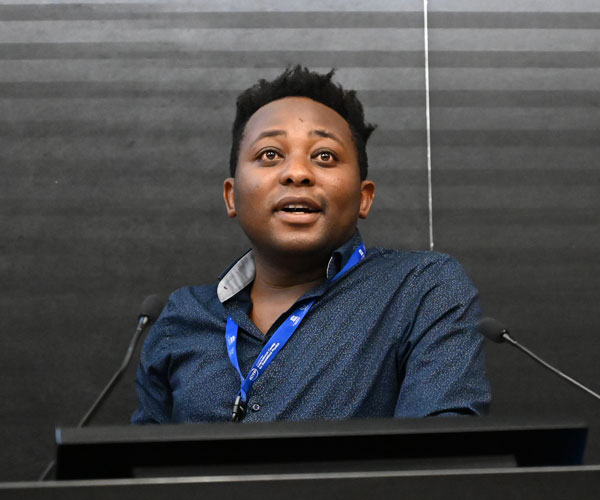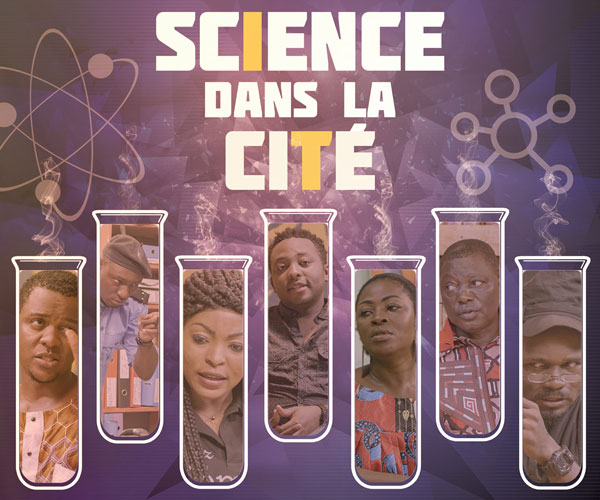Stéphane Kenmoe returned to the campus of the International Centre for Theoretical Physics (ICTP) in Trieste in May, along with his friend, fellow physicist and partner in science Raïssa Malu. He feels at home there, because, in 2011, he graduated from an ICTP Postgraduate Diploma Programme, and, since 2017, he has been visiting the campus regularly for workshops and conferences.
Kenmoe earned his PhD at the Max Planck Institute for Iron Research, then occupied his first postdoctoral position at the University of Duisburg-Essen, where he is now pursuing habilitation, one the possible paths to professorship in Germany.
Kenmoe is a natural-born communicator and his combined passion for both science and communications has shaped his engagements of the last years. As a scientist from Cameroon, he is well aware that in Africa there's a gap between science and decision makers, between science and regular people, between science and possible private donors. "There's a disconnect in Africa between the brilliant ideas of scientists working towards Africa's development and those who take decisions," he pointed out. And, he has been fully engaged in contributing to filling that gap.
Kenmoe firmly believes that scientists themselves have to communicate science, make it palatable, accessible, using the tools they have. "We, scientists, have to promote science, and build an energy that is missing in the African society: the energy that connects science to everybody, including people who can invest into science, as well as policymakers," he said.
Kenmoe was never formally trained as a communicator: connecting to people and explaining science just came natural to him. But, he recalled, "six years ago, I went back to Cameroon on holiday, and a former classmate of mine, who is a journalist, invited me to participate in his TV show, because he was missing a guest." That's how it all started. The show was called 'L'expert'—The Expert—and Kenmoe's friend encouraged him to talk about quantum physics. Which he did successfully. Now, in addition to his strictly scientific engagements, Kenmoe is a well-known science communicator often featuring in African TV shows and on social media (Facebook and You Tube). He even produced a film.
He believes that every scientist should get the message across using the 'tool'—or one may call it additional vocation—she or he has, may it be writing a novel, producing a TV show, speaking in public or painting. "There are world-class scientists in Africa," he said, "and communications is not only about eloquence. Good communicators are people who, by a given means, make themselves understood by somebody else."
"Africa is driven by the urgent needs to innovate, to eat, to have good health care," he continued. And this is the reason why it's so important for scientists to be good communicators! If not, regular people handling such basic issues as achieving food security cannot, and will not, respond to the 'call of science'. They may do so only if and when science is 'translated' into something that directly affects their lives, their livelihoods and well-being.
Kenmoe strongly believes in the power of communication, including through movies and TV shows: As an example, he mentioned the ground-breaking documentary series "Years of Living Dangerously", which provided first-hand reports on those affected by climate change, and in which actors of the calibre of Don Cheadle and Harrison Ford, among many others, were involved. Or like the American TV show "The Big Bang Theory", which, in its season 5, featured Stephen Hawking, the real British theoretical physicist and cosmologist! That's exactly the power of science communications Kenmoe believes in.
"Science communications is key to create the political will to promote science in Africa, and to involve regular people, people who go to bars, which, in many African countries, are the main gathering places," Kenmoe explained. This is why, the setting of the movie series he produced—"Science in the city"—is a bar. The series' main character is a scientist by training, who opens a bar because he could not find a job as a scientist, but who ultimately makes a profit in his commercial activity using his scientific background. The series is available online on the pan-African Cameroon-based DASH TV and CINAF, and was screened in African universities, and to secondary school students and during workshops all over the continent.
Nature gifted Kenmoe with the ability to be equally effective and at ease addressing an audience of fellow scientists at ICTP, talking about science with bars' patrons, conducting a TV show, writing a novel, appearing on social media or producing a movie, thus conveying the message of how vital science is, particularly in Africa. And if science is understood, if science becomes approachable, then it can really fulfil the goal of improving peoples' lives, of improving life in, and the development of, Africa. Kenmoe is paving the way of science communications in Africa. May he be a role model for other scientists.
Raffaella De Lia

